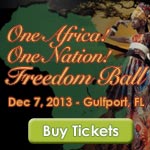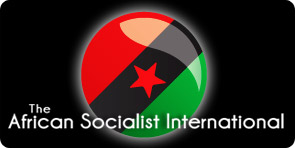The History of The ASI
Presented by Luwezi Kinshasa
The African Liberation Movement is an international movement. It started in Africa when the first white pirates or murderers or invaders attacked Africa and stole Africans and took them away to the Americas. In that process, the African Liberation Movement was also taken to the Americas, and the connection between Africans and Africa was never broken.
Wherever Africans have fought for liberation, we always wanted to go home because we still remembered home as the place where we were free. This helps people to understand our struggle, because every time you raise the issue of African liberation in Brazil or in America people say, "You can’t do that! This is America! They’re Americans! Or this is Brazil, and they’re Brazilians!"
Africans are fighting for African liberation around the world. Because of our forced dispersal, we have been fighting in isolation. The Africans in the Caribbean fight without connections to the Africans in South America in Peru, Venezuela or Bolivia. The Africans in the United States fight without connections to the Africans in the Congo or Ghana. When Africans were attacked in Senegal, as part of the process of enslaving Africans, the Africans in South Africa didn’t know or were not in any strategic alliance or unity with the Africans up North. So that makes us weak.
Throughout the enslavement of Africans – over three centuries – a new system was born. Often people say, "Slavery happened a long time ago. Forget about it." The British arrogance even says things like, "You’ve got a chip on your shoulder." But the key thing is that out of the enslavement of Africans a new world system was born. That’s the capitalist system. It was born in the process of enslaving Africans. So you can’t just talk to me about ending slavery. You’ve got to talk to me about the end of capitalism. That’s the process we’re looking at.
You can’t say you’re free now because the system that was born out of our enslavement is enslaving us right now as we’re talking. Capitalism is worldwide. The reason that capitalism is worldwide is because of the enslavement of Africans that took place throughout the Americas and in Africa itself.
So the process of fighting capitalism is a process to overturn the verdict of white power upon African people. The verdict of white imperialism upon the African people is that Africans have to be slaves forever.
When you see a picture of Africans catching hell in Somalia or in South Africa or anywhere else, that’s the verdict of imperialism looting us. That’s the relationship we were forced into with white power 500 years ago, and that relationship has not ended.
So when we say build the African Liberation Movement, build the African Socialist International (ASI), we’re talking about overturning that process. We’re talking about ending our relationship with white power, because the relationship with white power requires Africans to be slaves.
It doesn’t matter if you have chains around you when you starve, when you don’t control your land, when the armies in Africa have been designed to kill the people, when IMF and the World Bank go in Africa anytime they want and control the currencies. Everyone knows all the currencies go down everyday, and all the mines and the plantations are controlled by white power. That’s the relationship that we want to overturn.
Africans who live in the U.S. or who live in Britain are being told to fight against racism. We’re not fighting against the ideas in the heads of white people. We’re fighting for control over our lives. We want to control our black lives. The black destiny must be in the hands of black people. That’s what we’re fighting for.
It doesn’t matter if white people like Africans or not. What matters is that African people must achieve power. That’s what matters. We must achieve power.
So the question of building the African Socialist International is a process of achieving power for the African community in the entire world. We already said earlier that our connection with Africa no matter where we are has never been broken.
You probably remember the Marcus Garvey Movement early last century in America. It was a movement that was organizing Africans around the world. The membership of the Garvey Movement reached or exceeded six million people. Up to this date there is no organization to match that in the African world. Over six million people!
The Garvey Movement had members in the U.S., the Caribbean and in Africa. Most of the demands that were used to drive the struggle of African Liberation in the continent came from the program of Marcus Garvey.
That was the legacy of Marcus Garvey. Our organization itself comes from the legacy of Marcus Garvey.
Marcus Garvey was probably one of the greatest internationalists in the world. Not only did he organize the Africans, but he also gave support to the struggle of the native people of Nicaragua. He also gave support to the struggles for Asia and India. He also supported the struggle for national liberation of the Irish people. That was the significance of Marcus Garvey.
Now everyone here remembers the struggle of the ‘50s and ‘60s. You had a tremendous struggle developing around the world. The Chinese had just achieved liberation under the leadership of Chairman Mao. India had just gained independence from Britain. Indonesia had also gained independence from the Dutch. The entire non-white world was fighting for freedom and independence.
Africa was also a part of that process. In the ‘50s you heard about the Mau Mau who fought against British domination in Kenya. In the process, Britain murdered over 300,000 Africans in Kenya. That process goes on today. You know the British army has been taken to court for murdering and killing African women in Kenya.
The point I’m trying to make here is that in the ‘50s and ‘60s you had the African Liberation Movement asking for independence. All these struggles were led by what we characterize as the African petty bourgeousie. Be it in Kenya, be it in Malawi, be it in Jamaica, all those struggles for independence were happening at the same time, but aren’t connected. We’ve been fighting separately and our struggles were led by the African petty bourgeousie.
The conclusion was a retreat. White power retreated and left the State power leadership in the hands of the African petty bourgeousie. So, the African petty bourgeousie had access to power, but the masses did not have access to power. The result is the African petty bourgeousie became even more vicious than the white rulers.
For forty years subsequent to the struggle for black power that was defeated, you had civil servants, mayors, generals, chiefs of police being Africans in the U.S. But the situation for Africans in the U.S. is worse than forty years ago. The situation for Africans in Jamaica and Trinidad is worse than forty years ago, and the situation for Africans in Africa is worse. In South Africa, the African National Congress (ANC) has been in power for several years, but the situation is already worse than when white power was in control in South Africa.
The masses also recognize that. They’re saying, "Under white rule things were better." That’s the conclusion that the masses are coming to in Africa.
Of course, the imperialists are jumping on that, and they’re saying, "when we were there you were better off, therefore we must go back to you."
The conditions are worse because this leadership is in the hands of the African petty bourgeoisie, which is simply an extension of white power. It doesn’t matter how dark they are. It doesn’t matter if they talk the same languages as some of us: Yoruba, Zulu. Their program is the same as white power. Even worse, because they have to satisfy the needs of white power and at the same time they have to satisfy their own needs as a class, the African petty bourgeois class. That makes things worse.
Now, in America you had the Civil Rights Movement led by people like Martin Luther King, and you also have the Black Power Movement that was led by Malcolm X and later by the Black Panther Party and our Chairman Omali Yeshitela, who was part of the JOMO organization, and other lesser known organizations in the U.S.
So, you had two leaderships in competition. You had the African working class represented by Malcolm X and the Black Panther Party, and the African petty bourgeoisie represented by Martin Luther King.
As you know, the U.S. government, in alliance with the African petty bourgeoisie, militarily attacked our movement in the U.S., destroyed it, and raised up people like Jesse Jackson, Andrew Young, Wilson Goode and so on as the leaders of African people. That process also happened throughout Africa as we said earlier on.
The point we’re trying to make here is that the African petty bourgeoisie came to power in the U.S., because the African working class shook the United States to its foundation. Throughout the whole African world, we’ve had the African working class and peasants being in the struggle, but not leading any struggle.
From South Africa up to the Caribbean, African working class people were the main forces in the struggle, but not the main leadership. The leadership was in the hands of the African petty bourgeoisie, but in the U.S., the leadership was taken away from the African petty bourgeoisie by Malcolm X, the Black Panther Party and JOMO and other organizations of the African working class. That was a crisis.
Today, because the African working class rose up in the U.S., it was able as a class to project the long-term interests of the entire African working class in the world. That’s why we’re here today. Because the African working class in the U.S. was able to identify our long-term interests, devise a program, devise a strategy, come to the conclusion that for us in the U.S. or in France or in Africa to be free we must have a single organization of African workers across all the borders in the world where African communities live.
It’s that process that’s led our organization, the African People’s Socialist Party (APSP), in 1981 to set these goals. Through our Party Congress of 1981 the task was set that the African Socialist International must be built. Since 1981, Chairman Omali Yeshitela has been traveling around the world, working to create this organization.
He’s been in Britain many times. I met him in 1994. He was over here in ’83 trying to see the Africans in Britain. He was in France in ’82. I was there but I didn’t know he was around so we didn’t meet. But he’s been looking for the African working class to unite so we can start this process of building the African Socialist International.
In 1999, we were able to hold the first plenary to build the African Socialist International right here in London. We invited all the organizations of African people that we knew of, and many organizations turned up and we agreed to meet next year, which was the year 2000, so we could take that process forward.
But in the year 2000, none of these organizations turned up. Only the masses turned up, and that has convinced us that instead of taking this process to your organizations that have shown their unwillingness to build the leadership of the African working class, let’s take it to the African working masses themselves. In the year 2000 we built the International People’s Democratic Uhuru Movement (InPDUM) here in London, which was a process to try to bring the African working class back into political life as individual forces.
We had our plenary in the year 2000, and there was a follow-up. Before the year 2000 ended, we came with the resolutions we have been giving out or selling at the door. I think most of you have copies. We will be going through these resolutions in a moment.
In the year 2001, we also had another African Socialist International plenary. We also traveled to France trying to meet the African working class there. We met an organization of African people there. We are still in the process of consolidating that unity.
That process brings us here today in London again. We believe today and tomorrow’s meetings are going to be of significant importance. We hope to be able to pull into our organization as many African workers today as we can who will be able to organize the African people in Britain and throughout Europe so that we can take the process of building the African Socialist International forward.
Thank you for your patience. I know I’ve been talking for a long time. Uhuru














